-
May 19, 1914
Max Perutz is born in Vienna
-
1950's
Development of St. Marx area begins
A radio factory is built on the location which would later become the Max Perutz Labs and the VBC 6.
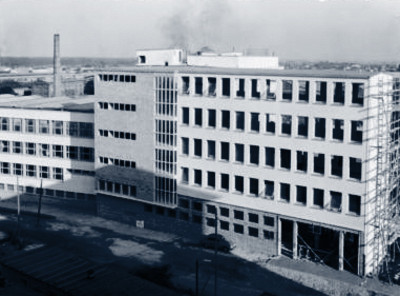 1955
1955 -
Max Perutz leaves Austria
He decides to become a research student in Cambridge.
1936 -
December 1962
Nobel Prize for Max Perutz
Max F. Perutz and John C. Kendrew receive the Nobel Prize for Chemistry for their studies of globular proteins.
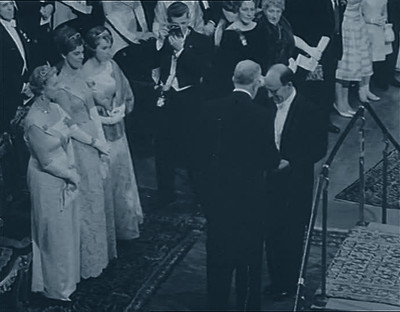 1962
1962 -
September 1985
Kick-start of the Vienna BioCenter
Pharmaceutical companies Boehringer Ingelheim and Genentech decide to found a basic research institute and can be convinced to choose Vienna. The agreement includes to move related university institutes to the new location in St. Marx in Vienna's third district to kick-start a bio-center.
1980 -
New life in St. Marx
The newly established Vienna BioCenter takes over an area that has seen an eventful past. It was once the gate to the medieaval city, the location of a brewery, a hospital for the poor and, most recently, the location of the city's slaughterhouse.
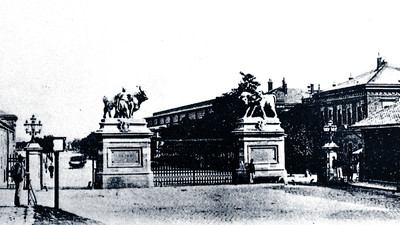 1987
1987 -
May 1992
Max Perutz Labs building is finished
The construction of the new university building, which will later become the Max F. Perutz Laboratories, is finished, adding a new landmark to the Vienna BioCenter.
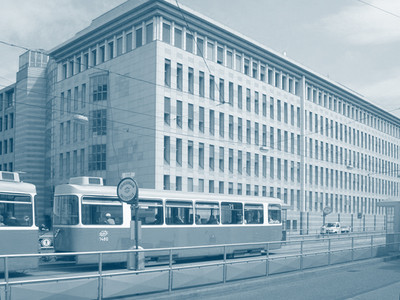 1992
1992 -
February 6, 2002
Max Perutz passes away
Max Perutz dies in Cambridge at the age of 88. His legacy in establishing the research field of Molecular Biology continues to live on in science today.
2002 -
2002
An idea comes to life
Researchers from the University of Vienna, the Medical University with the support of policy makers agree to establish an internationally competitive research institute.
-
July 2002
Max Perutz's legacy lives on
Gisela Perutz, Max's Widow, grants permission to name the new research institute after her late husband.
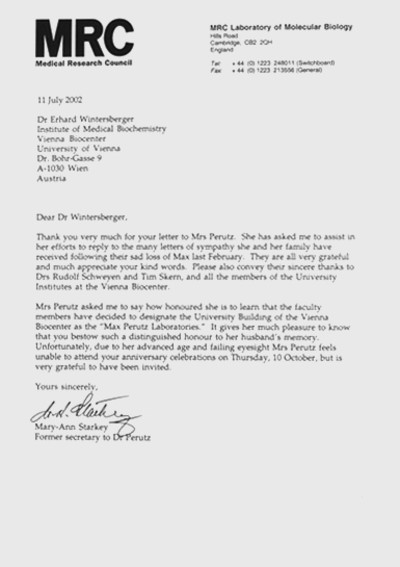
-
March 2005
Foundation of the Max F. Perutz Laboratories
The Max F. Perutz Laboratories are established in honour of an extraordinary teacher and scientist.
2005 -
January 2007
First Scientific Director
Graham Warren is appointed as the first Scientific Director of the Max F. Perutz Laboratories. His strategy of attracting young, competitive, and highly motivated researchers shapes the future of the institute.
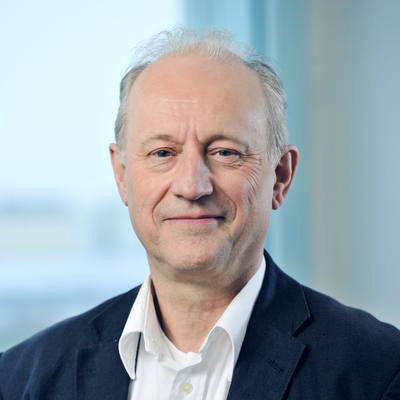 2007
2007 -
August 2012
Breakthrough Study by Emanuelle Charpentier
Group leader Emmanuelle Charpentier and her team publish - in conjunction with Jennifer Doudna’s group at Berkeley - a breakthrough study that reveals the molecular mechanism of the type II CRISPR system. The implications for genome engineering are enormous.
2012 -
September 2014
Crossing Frontiers in Life Sciences
The 100th birthday of Max Perutz is celebrated with the "Crossing Frontiers in Life Sciences" symposium in Vienna. Internationally renowned scientists and Max F. Perutz Laboratories researchers talk about structural biology, cell signalling, bioinformatics, RNA biology, and chromosome dynamics.
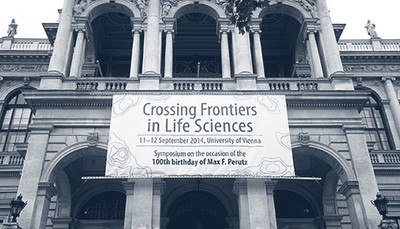 2014
2014 -
2015
Grants and Awards
10 years after its foundation the Max F. Perutz Laboratories boast an impressive track record of prestigous research awards: 6 ERC Starting grants, 1 ERC Consolidator grant, 4 WWTF Young Investigators grants, 5 START Prizes, 7 EMBO Memberships, 3 EMBO Young Investigators and 3 Human Frontier in Science Program (HFSP) grants.
2015 -
April 2017
New Directorate
Arndt von Haeseler is appointed Scientific Director.
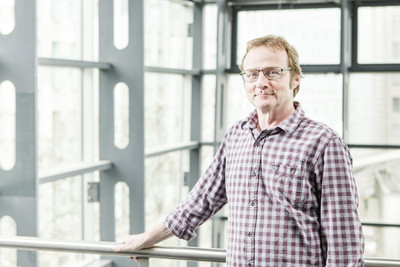 2017
2017 -
July 2019
Hans Tuppy named Honorary Faculty Member of the Perutz
Beyond his scientific achievements, Hans Tuppy (1924 - 2024) made a lasting impression on Austrian academia and scientific policy. Serving as Minister of Science and Rector of the University of Vienna, among other roles, he played a pivotal part in shaping Austria's scientific landscape. Notably, his efforts were instrumental in establishing the Vienna BioCenter.
 2019
2019 -
May 2019
MFPL becomes Max Perutz Labs Vienna
Renaming MFPL to Max Perutz Labs Vienna is a symbol for the institute upholding the values Max Perutz stands for: creating an open environment where ideas can be exchanged and international researchers can thrive. It also symbolizes the institute's dedication to a mechanistic understanding of important biological processes - with the potential to catalyze groundbreaking discoveries in mechanistic biomedicine.
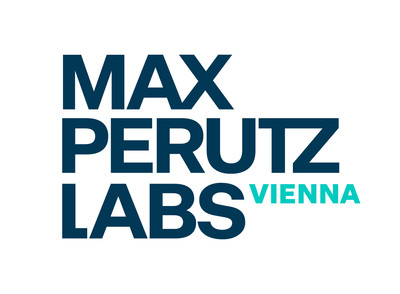
-
March 2020
Alwin Köhler appointed Scientific Director
Under his leadership, the Perutz sharpens its focus on mechanistic biology, attracts top international scientists, and strengthens support for early-career researchers.
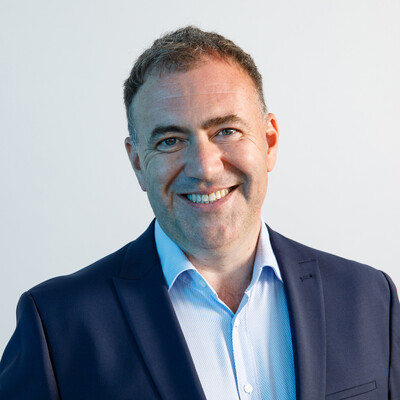 2020
2020 -
October 2020
Nobel Prize for Emanuelle Charpentier
Former Perutz faculty member, Emmanuelle Charpentier, receives the Nobel prize in Chemistry for her groundbreaking contributions to CRISPR-Cas9 gene editing, for which she laid the foundation during her time at the Perutz (2002–2009).

-
February 2021
A new beginning
The Max Perutz Labs are rebuilding key parts of the institute. The opening of the new entrance, reception, and study space for students marks a first milestone of a major project that will provide creative space for researchers to meet and to discuss ideas.
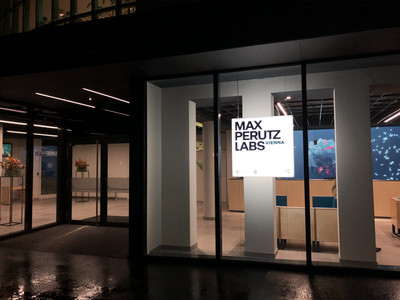 2021
2021 -
September 2021
Coffee with a view
The “Max Bar” pop-up café creates a room where new ideas and collaborations can arise from spontaneous, informal discussions over a coffee break.
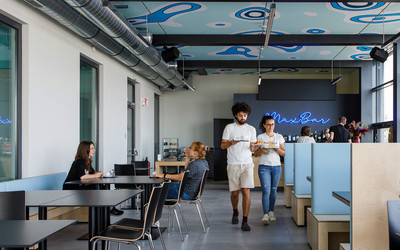
-
May 2022
Exhibition opens
"Breathing at High Altitude" – an exhibition about the life and science of Max Perutz opens its doors. The project was initiated by the Max Perutz Labs with the goal of sparking curiosity among the broader public about this pioneer of molecular biology.
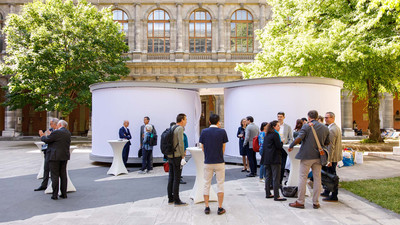 2022
2022 -
November 2022
Max Perutz Mural
On the facade of the Max Perutz Labs the artist duo Käthe Schönle and Sebastian Schager, in collaboration with the art & science project ‘WIENERWISSEN’, created a large mural picturing the Austrian-British Nobel Prize winner Max Perutz.
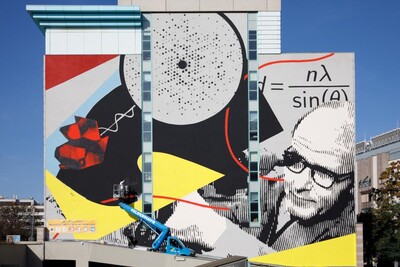
-
2025
Max Perutz Labs 20th Anniversary
The year 2025 marks the 20th anniversary of the Max Perutz Labs celebrating 20 years of transformative basic research. Dedicated to a mechanistic understanding of fundamental biomedical processes, the Perutz has grown into an internationally recognized research institution.
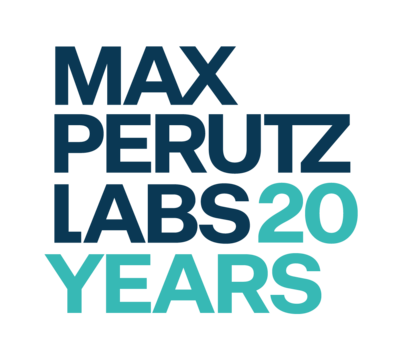 2025
2025 -
June 24, 2025
20th Anniversary Lectures and Celebration
From thought-provoking Perutz Lectures and a visionary keynote to a spirited panel discussion, a beatboxing flutist, and celebrations that carried late into the night. A joyful tribute to science, curiosity, and the community that brings it to life.
